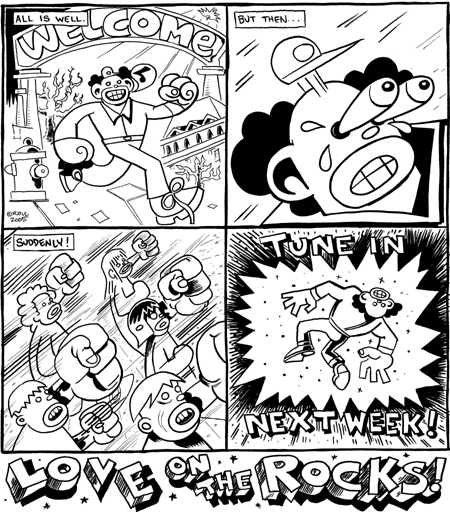Complexity can sour relationship with city
Cambridge is an easy city to love, and love passionately. Like all intense relationships, though, it’s easy for love to turn to loathing.
Newcomers can be instantly charmed by the city, overwhelmed by the choice of cuisine and enraptured by the vibrant street life. Emerging from the T at Harvard Square on a day in late June, for instance, you would have seen Muslim teens rapping serially, passionately, on one side of the structure, and someone in a bee costume on the other. LaRouche acolytes balanced out the rappers, and nearby was a young man holding a sword, bent forward at the waist to appreciate scents being hawked by a middle-aged Avon saleswoman. Three friends, also holding props, waited patiently nearby. The bee was not even part of their crowd.
This overlapping life is pleasant, and viewers often feel blissed-out, as though everything in this small part of the world is at peace, or at least on the right path, or at least fighting the good fight of understanding and civility.
Above the T, buses, cars, bicyclists and pedestrians navigate their shared straits with graciousness. Usually.
When a car hits a person, the driver gets out, helps the victim up — and, assured she’s okay, starts yelling at her about running into traffic.
Being in Cambridge can be a little like living inside one of those giant George Rhoads art installations at the Museum of Science and Logan International Airport. It’s fun to watch all the bouncing and bumping and moving, but one can imagine wishing from inside it would all stop for a moment of peace.
It’s this complexity that can be so shattering to affection for, or adoration of, the city, and it’s not even unique to Cambridge, although it feels like it is.
More than one in five residents were born in another country, officials boast, which is exciting and exotic but can curdle into alienation and unthinking gripes about the “political correctness” needed to address such a society. It’s also easy to accuse Cambridge’s famous liberalism of being groupthink in which no one is free to explore concepts outside a few left-wing tenets.
Even some of the food that is the delight of Cambridge can feel burdensome and bewildering. Fire + Ice on a busy night is like eating inside a pinball machine. The crew at Anna’s Taqueria can be so efficient at moving the crowd along that they may slap chicken onto a tortilla before a customer has said a word. And the customer didn’t want chicken.
The very nature of the city works against it. Everyone wants to be here, especially the young, but that makes it expensive to live here. City councilors defend their refusal to cut services to ease property taxes by saying cutting services is against what Cambridge stands for. This evolves into the question of what to do with the city’s homeless — as some warn that the better things are for them in Cambridge, the more will come. Everyone from the high-heeled to the disabled is tripping on brick sidewalks, but getting rid of the bricks is historically and emotionally unthinkable. It’s wonderful to be able to walk or ride a bicycle to anywhere in the city — until the day you’re feeling sick, cold, rushed or lazy. The praises of public transportation can be sung — until the time the T is a half-hour late. Drivers can feel smothered under a sheaf of parking tickets. The youth and beauty of Cambridge’s constantly recycling student population can make you feel eternally young, then crushingly old.
Institutions of higher learning shaped the city, from giving a name and purpose to Harvard Square to serving as an incubator of the world-changing capabilities of Kendall Square’s high-tech and biotech industries. But residents fear and resent the power of those institutions transforming their world, perceived to be oblivious to the cries of the individual next door. Pride in the cutting-edge, high-level work produced by Harvard University and the Massachusetts Institute of Technology is inevitably rattled when residents learn of the institutions’ nuclear cyclotron and nuclear research reactor. Lesley University is about to transform Porter Square, and the possibilities for residents are tremendously exciting and a little scary; there is pride and resentment, anticipation and anxiety, over a square simultaneously getting and losing an identity.
Perhaps nothing better captures the contradictory complexity of Cambridge than its system of voting.
Proportional representation is good and sensible, a way to end uncertainties in voting and eliminate expensive runoff elections. In theory, it also cuts down on negative campaigning. And it’s essentially unique to Cambridge in this country (though San Francisco uses a variation), allowing the electorate to feel wise, special and more like citizens of the world, where such voting techniques are common, than like relatives of retirees in Florida.
But its workings can be difficult to grasp and to describe. Candidates reach quotas calculated by dividing the total number of ballots cast plus one by the number of positions to be elected plus one, and a candidate’s remaining ballots are redistributed …
It’s the perfect system for a city that does almost everything the hard and thoughtful way, which complicates and enervates, leaving feelings of exhaustion, righteousness and resentment all at once. Love shouldn’t be this much work.
In Cambridge, it is. The honeymoon may be over quickly, but the relationship goes on.

